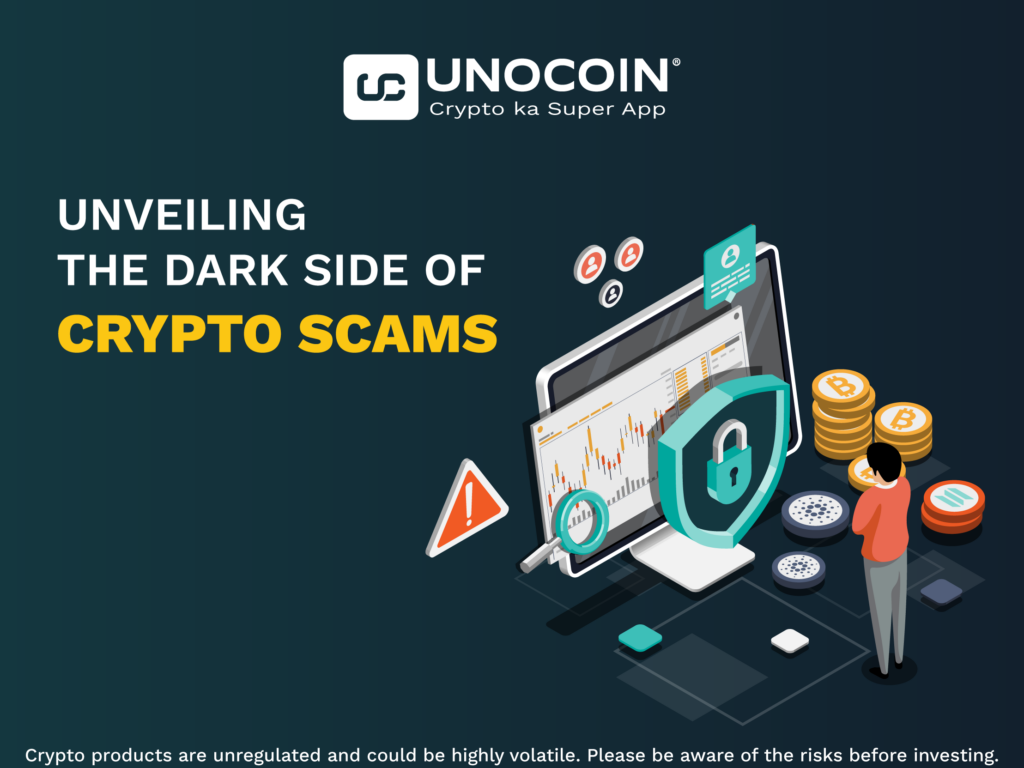Crypto fraud is a persistent problem in the cryptocurrency space, taking advantage of the decentralized and pseudonymous nature of blockchain transactions. These scams take many forms and can result in significant financial losses for unsuspecting victims.
Some common types of crypto scams:
- Ponzi schemes: Ponzi schemes promise high returns on investment and rely on funds from new investors to pay previous investors. As the system grows, it becomes unsustainable and eventually collapses, leaving many investors with losses.
- Phishing Scams: Phishing scams involve fraudulent websites or emails posing as legitimate cryptocurrency exchanges or wallets. Unsuspecting users can enter their credentials or private keys, giving fraudsters access to their funds.
- Fake ICOs and Token Sales: Fraudsters create fake Initial Coin Offerings (ICOs) or token sales, asking for investment in non-existent projects or tokens. Once funded, they disappear, leaving investors with worthless tokens.
- Pump and Dump Schemes: In pump and dump schemes, fraudsters artificially inflate the price of a low-value cryptocurrency by spreading positive rumors or misinformation. Once the price rises, they sell their holdings, causing the price to fall and other investors to suffer losses.
- Social Media Scams: Scammers impersonate prominent personalities or influencers on social media and claim to be giving away cryptocurrencies. They ask users to send them a small amount of cryptocurrency to participate, but the promised gift never happens.
- Fake investment platforms: Fraudsters create fake investment platforms that promise guaranteed returns or use trading robots to generate profits. In reality, they do not invest funds and simply steal from their victims.
- Malware and Ransomware Attacks: Fraudsters use malware or ransomware to gain access to users’ cryptocurrency wallets or private keys and hold their funds hostage until a ransom is paid.
- Pump Groups and Insider Trading: Some groups coordinate “pump” efforts to artificially increase the price of cryptocurrency, often using inside information or coordinating large buy orders.
How to protect yourself from crypto scams:
- Do your research: Always thoroughly research any cryptocurrency project, exchange, or investment opportunity before getting involved.
- Use trusted exchanges and wallets: Stick to reputable cryptocurrency exchanges and wallets that have a proven track record of high security.
- Be skeptical of promises: Be wary of any investment or opportunity that promises guaranteed high returns with little or no risk.
- Double-check URLs and emails: Make sure you’re accessing legitimate websites and never click on suspicious links in emails.
- Keep your private keys safe: Never share your private keys or wallet recovery phrases with anyone.
- Report Suspicious Activity: If you come across a suspicious or fraudulent scheme, report it to the relevant authorities or the relevant platform.
Please find the list of authentic Unocoin accounts for all your queries below:
- YouTube Channel: https://www.youtube.com/c/Unocoin/videos
- Newsletter: https://medium.com/subscribe/@Unocoin_growth
- Blogs: https://blog.unocoin.com
- Instagram: https://www.instagram.com/unocoin/
- Twitter: https://twitter.com/Unocoin
- Facebook: https://www.facebook.com/unocoin/
- LinkedIn: https://in.linkedin.com/company/unocoin
- Telegram Group: https://t.me/Unocoin_Group
- Telegram Channel: https://t.me/+fasQhTKBsfA5N2Zl
- Telegram: https://t.me/UnocoinSupport_Bot
- E-mail id: support@unocoin.com
- Contact details: 7788978910 (09:30 AM IST – 06:30 PM, Mon – Sat)
- App store link: https://apps.apple.com/us/app/unocoin/id1030422972?ls=1
- Playstore link: https://play.google.com/store/apps/details?id=com.unocoin.unocoinwallet
Disclaimer: Crypto products are unregulated as of this date in India. They could be highly volatile. At Unocoin, we understand that there is a need to protect consumer interests as this form of trading and investment has risks that consumers may not be aware of. To ensure that consumers who deal in crypto products are not misled, they are advised to DYOR (Do Your Own Research).

